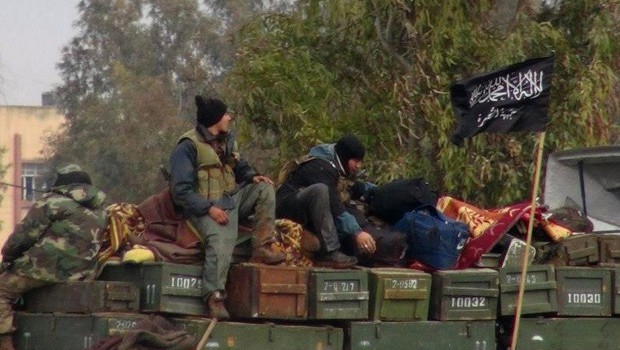
This Friday, January 11, 2013 file citizen journalism image provided by Edlib News Network (ENN), which has been authenticated based on its contents and other AP reporting, shows rebels from Al-Qaeda-affiliated Jabhat Al-Nusra as they sit on a truck full of ammunition in Idlib province, northern Syria. (AP Photo/Edlib News Network ENN, File)
But then Youssef walked into the room, and I knew it would all be okay. He had one of those faces: warm, always smiling, etched with teenage conviviality and impossible not to like. He liked me instantly, too, and that evening we downed sugary drinks until we became high and hysterical, and danced—badly—to Metallica as shellfire crumped in the distance. After I left Aleppo we kept in touch, and when I returned to the city two months later I wanted to see him first. And there he was, with the same gleaming smile and the same warm hug I remembered.
But something had changed in Youssef. As we drove across Aleppo to find somewhere to buy kebab, he told me that he’d applied to join the Al-Nusra Front, the foreign Islamist group that declared its allegiance to Al-Qaeda just a few weeks ago. “Al-Qaeda are good!” he told me, with a smile and a double thumbs up. “I hope that they’ll accept me and that one day I can set off a suicide bomb in a regime area.”
As we passed through the battered streets he told me his reasons. First was the monthly salary of 11,000 Syrian lira. It is a pitiful wage for a potential suicide bomber, but enough to tempt an eighteen-year-old stuck in a war zone with no job, no money and nowhere to study. His dream, he said, was to come to London. “I’d like to go abroad and make something of myself. But how can I do that without money and a passport? Maybe I can come to London and sleep on your floor. London is a great city.” I told him that suicide bombers had hit London eight years ago, and that they had killed scores of innocent people. Why would he want to do the same thing in Syria? “No, no, no!” Youssef waved his hands, distraught. “The bombers in London were not Al-Qaeda. And that’s not what I want to do. I’ll set off my bomb at a regime check-point. If I did it in a marketplace and killed normal people then everybody would start to hate Al-Qaeda and they would kick them out of Syria.”
I asked what his friends thought of his decision. He told me that his family lived in a Christian area of the city that remains in the hands of Bashar Al-Assad’s troops. When his uncle and grandfather were killed because of their support for the opposition, he and his parents fled to a rebel-held area of the city. But his friends and the rest of his family stayed in his old neighborhood, and they continued to support the government. “I still speak to them sometimes,” he said. “Most of their parents work for the regime, so they support the regime too. I told one friend that I could help his father defect, because I don’t want to have to kill him someday. But he said no. When I kill them, it will be revenge for what happened to my uncle and grandfather.”
Next, Youssef told me he’d lost faith with the more secular opposition brigades. “Most of them are criminals,” he said. “But Jabhat Al-Nusra are fighting effectively. They’ve fixed a lot of things in Aleppo, and I’m a hundred percent certain that they can make things better here.”
As I looked at him in his Gucci polo shirt, jeans and modish haircut, I found it difficult to imagine him in the get up of an Islamic extremist. “Will you have to grow a beard?” I asked. “You know, I’m pretty sure they won’t accept me,” he replied. “I’m too liberal. But maybe they’ll think I’ll be useful to them, because I can still go into regime areas so I could transport weapons there for them.”
He described an application process that would not seem out of place at a corporate multinational. He had put his name down on a list through a Lebanese friend, to wait his turn for an interview with one of the Al-Nusra Front’s top men. In the mean time, the group had scrutinized his Facebook page. “They don’t accept just anyone,” he told me. “You have to be serious about religion.” A photo of the two of us together in Aleppo had apparently given them cause for concern. “Because of that, they told me that I’m not ready yet,” he said. “I have to forget about the past, and stop mixing with women.”
After we had eaten, we said our goodbyes. We hugged and kissed each other on both cheeks, and I wondered if we would do that the next time we met. I hope that I will meet him again. I hope that Jabhat Al-Nusra will reject his application, although I fear that his eagerness, youth and thirst for revenge make him exactly the kind of recruit they are looking for. And more than anything, I hope that this war will soon be over, so that Aleppo can come back to life and the people can be optimistic about the future once again. Until that happens, Jabhat Al-Nusra will have no problems recruiting their foot-soldiers. They will carry on feeding on people like Youssef—ordinary boys who feel that they have nowhere else to go.

Trackbacks/Pingbacks